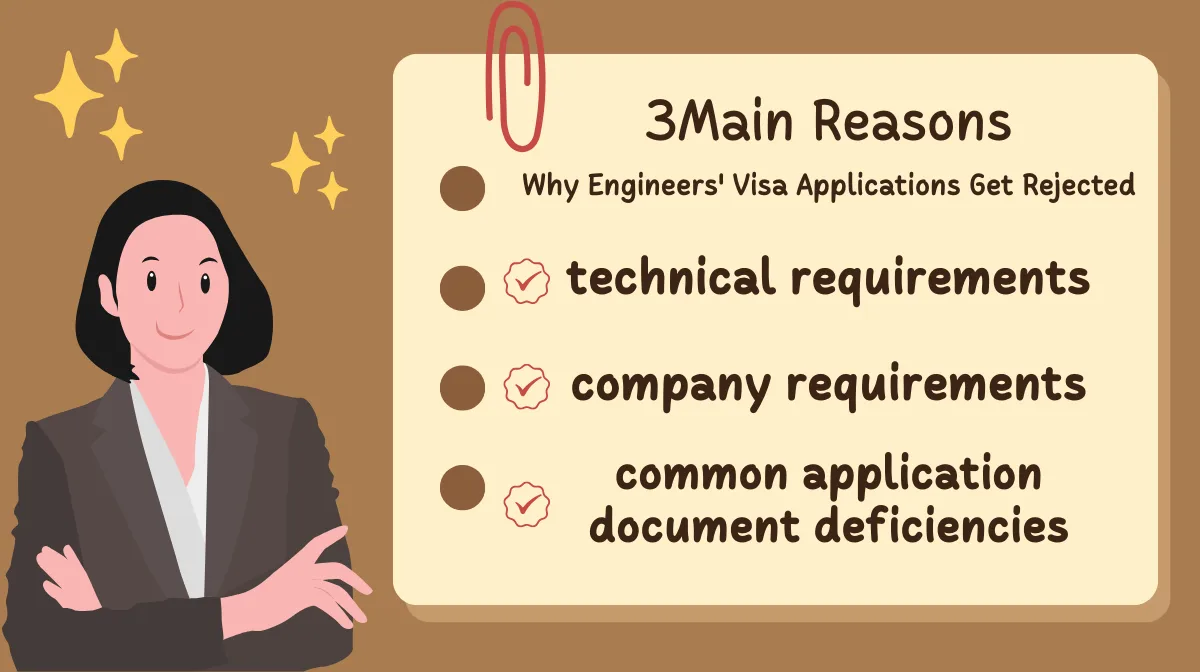For foreign engineers who want to work in Japan, obtaining a work visa is a crucial hurdle.
However, some engineers face rejection when applying for the “Engineer/Specialist in Humanities/International Services” residence status.
This article explains the main reasons why visa applications get rejected and provides practical strategies for successful acquisition.
- The three main reasons why engineer visa applications get rejected in Japan.
- Practical strategies to improve your application and increase chances of success.
- How to effectively coordinate with your employer for a successful reapplication.
1. 3Main Reasons Why Engineers’ Visa Applications Get Rejected

Foreign engineers who want to work in Japan will, in most cases, need to obtain an “Engineer/Specialist in Humanities/International Services” visa.
When applying for this work visa, a significant number of applicants face rejection issues.
Below, we explain the three main reasons for work visa application rejections
“technical requirements” “company requirements” and “common application document deficiencies”
Reference: Immigration Services Agency of Japan: “Engineer/Specialist in Humanities/International Services“
Not Meeting Technical Requirements
The “technical requirements” for the “Engineer/Specialist in Humanities/International Services” visa are among the most important criteria for working as a technician in Japan.
To obtain a work visa, you first need to receive a “Certificate of Eligibility” If you don’t meet the requirements, you may not receive this certificate.
For technical requirements, you need to prove either your “educational background” “practical experience” or “qualifications”
- [Educational Requirements]
A degree related to a specific technical field is required. For engineers, this includes mechanical engineering, electrical engineering, chemical engineering, etc. Graduation from a university, junior college, or graduate school in your home country or Japan (obtaining a bachelor’s degree or higher). Graduation from a Japanese vocational school (obtaining the title of “specialist”). - [Practical Experience Requirements]
If you don’t meet the educational requirements, you need more than 10 years of practical experience in the relevant technical field. This practical experience includes system management, software development, etc. Work experience as a full-time or contract employee is required. - [Qualification Requirements]
If you don’t meet the educational or practical experience requirements, you must possess technical qualifications “designated by the Minister of Justice related to information processing” This includes qualifications from both within Japan and overseas.
Insufficient Company Requirements
The second main reason for work visa application rejection is “insufficient company requirements”
Company requirements are… conditions that prove a company is sufficiently qualified to employ foreign workers.
- [Mismatch Between Specialization and Job Content]
Cases where the foreign employee’s specialization doesn’t match the job content at the company. Companies must ensure consistency between the hired foreigner’s skills and job content. - [Mismatch With Educational/Professional Background]
Job content that doesn’t align with the technology/knowledge required by the applied residence status can also cause work visa rejection. For example, hiring a foreigner who graduated from an education department as an engineer may be considered a specialization mismatch. - [Residency Status Issues]
Inappropriate residency status of foreign workers can lead to work visa application rejection. This includes cases of previously allowing work beyond permitted activity limits or instances of disappearance. - [Company’s Financial Condition]
The financial condition of the employing company is also important. It’s necessary to demonstrate business stability and continuity. Cases with significant financial losses that raise doubts about business stability increase the risk of rejection.
Common Application Document Deficiencies
The third factor leading to work visa application rejection is “common application document deficiencies”
- [Typographical Errors]
Typos or omissions in application documents can damage credibility. Especially when passport numbers or name spellings are incorrect, the assessment may become more stringent. The same applies when there are contradictions in the content. - [Missing Certification Documents]
Cases where graduation certificates, work history documents, employment contracts, and other certification documents are missing, expired, or incomplete. It’s necessary to confirm required documents in advance and prepare them accurately and on time. - [Verification of Document Accuracy]
Cases where submitted documents contain errors or lack consistency. The same applies to inconsistencies in work history documents or job description documents.
2. Specific Improvement Actions – Measures Applicants Can Take

Even if foreign engineers receive a visa rejection notice, taking appropriate measures can increase the success rate of reapplication.
Below, we introduce specific measures that applicants should take.
Concrete Methods to Prove Technical Skills
To concretely prove technical skills, you need to demonstrate specialization based on educational and work history.
For example, preparing academic transcripts that show the relationship between completed courses and job content.
For university graduates, a loose relevance between job content and education may be recognized, but vocational school graduates need to demonstrate clear consistency between their major and job content, so caution is needed.
Effective Presentation of Practical Experience
Practical experience varies by job content, but for engineers, more than 10 years of experience is required.
To effectively present practical experience, prepare an employment certificate that covers “employment period” “job duties” and “employing company”
Additionally, submitting supplementary materials such as pay slips or recommendation letters increases credibility. The key is ensuring all documents maintain consistency.
Utilizing the Highly Skilled Professional Points-Based System
The Highly Skilled Professional Points-Based System is a program that makes it easier for foreigners to obtain work visas in Japan.
Points are awarded based on education, work history, annual income, etc. And if you score 70 points or more, you’re recognized as a “highly skilled professional” This recognition grants various preferential measures such as extended period of stay and relaxed permanent residency requirements.
The Highly Skilled Professional Points-Based System is divided into three categories, and for engineers, it’s “Advanced Specialized/Technical Activities (Highly Skilled Professional (i)(b))” Obtaining a master’s degree and having relevant work experience result in high scores.
Additionally, passing the Japanese Language Proficiency Test and obtaining specific IT qualifications also add points. It’s necessary to clearly submit supporting documentation without deficiencies.
Reference: Immigration Services Agency of Japan: What is the Highly Skilled Professional Points-Based System?
■日本でエンジニアとしてキャリアアップしたい方へ
海外エンジニア転職支援サービス『 Bloomtech Career 』にご相談ください。「英語OK」「ビザサポートあり」「高年収企業」など、外国人エンジニア向けの求人を多数掲載。専任のキャリアアドバイザーが、あなたのスキル・希望に合った最適な日本企業をご紹介します。
▼簡単・無料!30秒で登録完了!まずはお気軽にご連絡ください!
Bloomtech Careerに無料相談してみる
3. Effective Coordination Methods with Companies

When a work visa application is rejected, closely coordinating with the company can increase the success rate of reapplication.
Below, we explain specific approaches for reviewing and improving application content in collaboration with companies.
Confirmation and Adjustment of Salary Conditions
Salary conditions are extremely important elements in work visa assessments. It’s verified whether the applicant will receive treatment equal to or better than Japanese workers.
Therefore, the company needs to prepare employment contracts and salary payment certificates to clearly prove that the applicant’s salary is equal to or higher than that of Japanese employees.
In addition to salary, having employee benefits equal to those of Japanese employees also affects the assessment criteria.
Preparation of Necessary Documents
Accurate preparation of necessary documents is essential for successful work visa applications.
- Documents prepared by the company
Employment contract, company registration certificate, etc.
Documents written in foreign languages must be accompanied by Japanese translations.
Cooperating with the company to prepare these documents quickly and accurately is important for smooth processing of the assessment.
Response During the Reapplication Period
Even if a work visa application is rejected, reapplication is often possible in many cases.
In this case, accurately understanding the reason for rejection is the top priority. Respond to notifications or summons from immigration authorities to receive explanations about specific rejection reasons and improvement points.
Company’s Preparation and Actions for Reapplication
For reapplication, correct the identified deficiencies and prepare and submit new documents reflecting the improvements.
When reapplying, it’s important to clearly show how the new application has improved compared to the previous one.
Consider seeking expert support as needed to further improve accuracy.
4. Specific Reapplication Process and Schedule

Even if a work visa application is rejected, you can increase the chances of success by planning your reapplication strategically.
Below, we explain the necessary preparations, responses, and methods for efficient schedule management for reapplication.
Application Document Preparation Plan
The first step in reapplication is a thorough review of application documents. Analyze the rejection reasons in detail and identify missing documents or deficient content. Then prepare necessary additional materials and certificates.
Since document content deficiencies and lack of information are often cited as causes for rejection, particular accuracy is required for reapplication.
Also, since preparing additional materials may take time, it’s important to create a schedule with ample buffer.
Assessment Period and Response
The assessment period after reapplication may be longer than for regular applications. This is because immigration authorities check the submitted documents more rigorously.
It’s important to be prepared to respond quickly in case additional documents or information are requested.
Also, assessment criteria tend to be stricter during reapplication since the rejection reasons are already clear. Therefore, consult with administrative scriveners or work visa application specialists as needed to prepare compelling application content.
Management of Cost and Time
Reapplication requires both time and cost. It’s important to understand in advance the expenses necessary for application, such as document preparation, translation fees, and specialist consultation fees, and to create a budget plan.
Also, estimate the time required for each reapplication step and plan the overall schedule in detail to facilitate efficient procedures.
■日本でエンジニアとしてキャリアアップしたい方へ
海外エンジニア転職支援サービス『 Bloomtech Career 』にご相談ください。「英語OK」「ビザサポートあり」「高年収企業」など、外国人エンジニア向けの求人を多数掲載。専任のキャリアアドバイザーが、あなたのスキル・希望に合った最適な日本企業をご紹介します。
▼簡単・無料!30秒で登録完了!まずはお気軽にご連絡ください!
Bloomtech Careerに無料相談してみる
5. Roadmap to Successful Visa Acquisition

To successfully obtain a work visa through reapplication, it’s important to implement long-term measures while referencing past successful cases and utilizing specialists.
Below, we introduce specific methods.
Concrete Success Cases
Looking back at successful reapplication cases, many thoroughly analyzed rejection reasons and implemented improvement measures.
- Case where initial application was rejected due to insufficient explanation of job duties
There are cases where permission was granted after submitting additional materials with specific and detailed job descriptions.
There are also cases of success after adjusting salary conditions to be equal to or better than Japanese employees and clarifying job content. Use these cases as reference and aim for applications that reflect improvement points.
How to Utilize Specialists
To increase the success rate of work visa applications, getting help from specialists is very effective.
Administrative scriveners and visa consultants are knowledgeable about the latest assessment criteria and required documents, and provide significant support in document preparation and deficiency correction.
In addition to streamlining the entire application process, utilizing specialist knowledge allows you to clearly convey appeal points.
Long-Term Measures
Smooth acquisition of work visas requires long-term planning and preparation. Applicants themselves are required to continue qualification acquisition and skill improvement to prove technical ability and work experience.
Companies, on the other hand, need to create environments where foreign talent can work comfortably. Strengthening in-house education programs and support systems are factors that enhance application credibility.
Also, accumulating past application results and utilizing them for future procedures can improve efficiency and success rates.
6. Clarify Reasons for Visa Rejection in Japan and Move Toward Reacquisition
Obtaining a work visa is never a simple process, but with proper preparation and measures, you can definitely lead it to success.
By enriching technical requirements, closely coordinating with companies, and effectively utilizing specialist support, you can obtain permission with a high probability even through reapplication.
Use the knowledge from this article to proceed with planned visa applications.

















